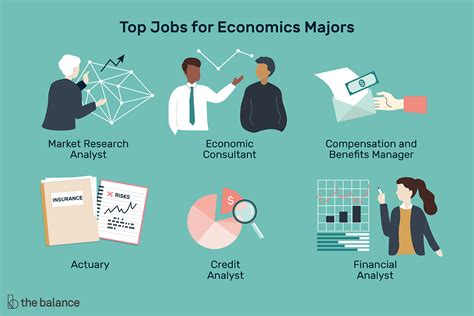As an economics major, you’ve delved into the intricate world of economic theories, data analysis, and forecasting. Now, it’s time to translate your knowledge into a fulfilling career. Here’s a comprehensive guide to the diverse entry-level jobs available to economics graduates, along with insights on how to stand out in the competitive job market.

Entry-Level Jobs That Value Economics Knowledge
1. Research Analyst
- Average Salary: $65,000 per year
- Key Responsibilities: Analyze economic data, identify trends, and provide insights to clients or organizations.
- Requirements: Strong analytical skills, data analysis expertise, and understanding of economic models.
2. Financial Analyst
- Average Salary: $75,000 per year
- Key Responsibilities: Evaluate investment opportunities, develop financial models, and advise clients on financial decisions.
- Requirements: Excellent communication skills, knowledge of financial markets, and proficiency in financial analysis tools.
3. Economic Consultant
- Average Salary: $85,000 per year
- Key Responsibilities: Provide expert advice on economic issues to governments, businesses, and non-profit organizations.
- Requirements: Advanced knowledge of economics, strong analytical abilities, and experience in policy analysis.
4. Market Research Analyst
- Average Salary: $60,000 per year
- Key Responsibilities: Gather and analyze data on consumer behavior, market trends, and industry dynamics.
- Requirements: Strong research skills, data analysis capabilities, and understanding of market research principles.
Innovative Career Paths for Economics Graduates
1. Data Scientist
Combining economics knowledge with expertise in data science, data scientists develop models, analyze data, and extract insights for businesses.
2. Risk Analyst
Economics majors with a strong understanding of risk assessment can pursue roles as risk analysts, evaluating potential risks and developing strategies to mitigate them.
3. Policy Analyst
Economics graduates can leverage their analytical skills in policy analysis, shaping public policies and addressing societal challenges.
4. Actuary
Actuaries apply economic principles to assess risk and develop insurance plans, making it a unique career path for economics majors interested in finance.
Benefits of Pursuing Entry-Level Jobs in Economics
1. High Earning Potential: Economics majors earn an average salary of $65,000 per year, a figure that surpasses the national average.
2. Job Security: Economics skills are in high demand in various sectors, providing graduates with job security and career stability.
3. Intellectual Stimulation: Economics jobs involve challenging analytical tasks, research, and problem-solving, ensuring intellectual stimulation and continuous learning.
4. Career Advancement Opportunities: Economics graduates have ample opportunities for career advancement into senior-level positions, such as economists, financial managers, and policy advisors.
How to Stand Out in the Job Market
1. Excel in Academics: Maintain a high GPA and pursue advanced courses in economics, statistics, and data analysis.
2. Build Internships: Gain practical experience through internships at financial institutions, consulting firms, or research organizations.
3. Develop Soft Skills: Hone your communication, teamwork, and interpersonal skills to showcase your ability to effectively collaborate and present your findings.
Common Mistakes to Avoid
1. Narrowing Your Job Search: Don’t limit yourself to traditional economics roles; explore unconventional career paths that utilize your economics knowledge.
2. Neglecting Networking: Attend industry events, connect with professionals on LinkedIn, and seek mentorship opportunities to expand your network.
3. Underestimating the Importance of Data Analysis: In today’s data-driven world, proficiency in data analysis is crucial for economics graduates.
Step-by-Step Approach to Entering an Economics Career
1. Identify Your Interests: Explore different subfields within economics to identify the areas that resonate with your interests and strengths.
2. Develop Essential Skills: Focus on acquiring strong analytical, data analysis, and communication skills, which are highly valued in the job market.
3. Build a Solid Resume: Highlight your relevant coursework, internships, and projects that demonstrate your economics knowledge and abilities.
4. Practice Interviewing: Prepare for interviews by researching potential employers, practicing answering common interview questions, and showcasing your enthusiasm for the field.
5. Start Your Career: Apply for entry-level positions in your desired industry, attend job fairs, and leverage your network to secure your first economics role.
Remember, entering an economics career is a journey that requires dedication, hard work, and a passion for understanding the complexities of the economy. By following these guidelines and embracing the opportunities that come your way, you can pave your way to a fulfilling and successful career as an economics major.
Additional Resources
- Bureau of Labor Statistics: Economics and Statistician Occupations
- National Association for Business Economics: Career Center
- American Economic Association: Resources for Economists
Tables
Table 1: Average Salaries for Entry-Level Economics Jobs
| Job Title | Average Salary |
|---|---|
| Research Analyst | $65,000 |
| Financial Analyst | $75,000 |
| Economic Consultant | $85,000 |
| Market Research Analyst | $60,000 |
Table 2: Job Demand for Economics Graduates
| Industry | Projected Employment Growth (2020-2030) |
|---|---|
| Financial Services | 11% |
| Government | 8% |
| Consulting | 7% |
| Healthcare | 6% |
| Education | 5% |
Table 3: Common Skills Required for Entry-Level Economics Jobs
| Skill | Description |
|---|---|
| Analytical Thinking | Ability to analyze data, identify trends, and draw conclusions |
| Data Analysis | Proficiency in statistical software and data visualization tools |
| Economic Modeling | Understanding of economic models and their applications |
| Communication | Strong written and verbal communication skills |
| Teamwork | Ability to collaborate effectively with colleagues and clients |
Table 4: Steps to Secure an Entry-Level Economics Job
| Step | Description |
|---|---|
| Identify Interests | Explore different subfields of economics to find areas that align with your strengths |
| Develop Skills | Focus on acquiring essential skills such as analytical thinking, data analysis, and communication |
| Build a Resume | Highlight relevant coursework, internships, and projects that demonstrate your economics knowledge and abilities |
| Practice Interviewing | Prepare for interviews by researching potential employers and practicing common interview questions |
| Start Your Career | Apply for entry-level positions in your desired industry, attend job fairs, and leverage your network |
